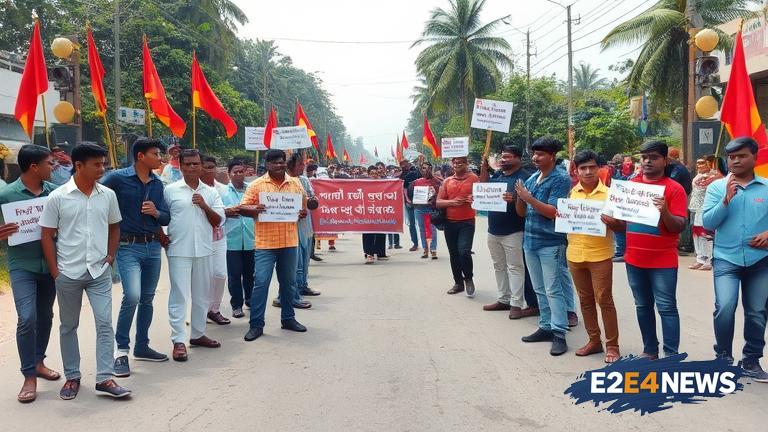A group of students in Tripura’s Dharmanagar town took to the streets to protest against the transfer of a biology teacher from their school. The students, who were visibly upset, blocked the main road in the town, causing traffic congestion and disrupting daily life. The teacher, who has been identified as a popular and experienced educator, was transferred to another school in the state. The students claim that the transfer was unfair and would negatively impact their academic performance. They argue that the teacher was not only a good educator but also a mentor and a role model. The students have been protesting for several days, and their demands have been met with resistance from the school authorities. The school administration has stated that the transfer was a routine administrative decision and that the students should not interfere with the functioning of the school. However, the students remain adamant that they will not back down until their demands are met. The protest has gained attention from local politicians and education officials, who have promised to look into the matter. The students have also received support from parents and teachers, who believe that the transfer was unjustified. The protest has highlighted the issue of teacher transfers in the state, which has been a contentious issue for many years. Many teachers and students feel that the transfers are often arbitrary and unfair, and that they can disrupt the academic environment. The state government has been criticized for its handling of the education sector, with many arguing that it has failed to address the concerns of teachers and students. The protest in Dharmanagar is just one example of the growing unrest among students and teachers in the state. The students have vowed to continue their protest until their demands are met, and the school authorities have been forced to reconsider their decision. The incident has also raised questions about the role of students in shaping education policy and the need for greater transparency and accountability in the education sector. The students’ protest has been peaceful, but it has disrupted life in the town and has caused inconvenience to commuters. The local administration has been forced to intervene, and negotiations are ongoing to resolve the issue. The students have also sought the support of social media, using platforms like Facebook and Twitter to raise awareness about their cause. The protest has gained traction online, with many people expressing support for the students and criticizing the school authorities for their handling of the situation. The incident has also highlighted the importance of social media in mobilizing public opinion and bringing attention to social causes. The students’ protest is a testament to the power of student activism and the need for greater engagement between students, teachers, and education authorities. The outcome of the protest is still uncertain, but it has already sparked a wider debate about the education sector in Tripura and the need for reform. The state government has been forced to take notice of the protest, and it remains to be seen how it will respond to the students’ demands. The incident has also raised questions about the future of education in the state and the need for greater investment in the sector. The students’ protest is a wake-up call for the state government, and it highlights the need for a more nuanced and responsive approach to education policy.
